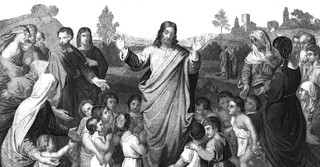Why Were People Shocked by the ‘I Am’ Statements Jesus Made?
Share

Jesus’ divine identity resonates with His “I am” statements in the Gospels. Each time he says, “I am,” he addresses the question posed by the prophet in Psalms 8:4: “What is man, that you are mindful of him, the son of man, that you care for him?”
Poets and philosophers have pondered this question—and related ones like “Who is God?” and “What is our relationship to God?”—since time began. The “I am” passages in the Gospels explain (in simple terms with complex meanings) Jesus’ role as God’s Son.
Does “I Am” Have a Special Meaning in the Bible?
Christians and nonbelievers alike are familiar with the story of Moses and the burning bush from which God spoke. Moses left his unstable, massive flock of Israelites to climb Mount Sinai and get as close to God as possible. Moses did not see God’s face or form but heard God speak out of the burning bush. Moses asked God how to explain who He was to the people of Israel, and God answered:
“I AM WHO I AM . . . Say this to the people of Israel, ‘I AM has sent me to you.’” (Exodus 3:13-14)
John Gill’s Exposition of the Bible, written in 1746 states that the phrase “I am” describes God’s “eternity and immutability, and his constancy and faithfulness in fulfilling his promises, for it includes all time, past, present, and to come; and the sense is, not only I am what I am at present, but I am what I have been, and I am what I shall be, and shall be what I am.”
How Often Does Jesus Make “I Am” Statements in the Bible?
The Gospel of John contains seven of Jesus’ “I am” statements. Here, Jesus speaks profoundly in seemingly simple lessons for His followers. He takes questions and asks questions meant to deepen our understanding of Him as our Messiah and Savior. These are the “I am” statements in the Gospel of John:
1. “I am the bread of life. He who comes to me will not go hungry” (John 6:35).
Jesus explained to a crowd—those remaining after Jesus and His disciples fed 5,000—that God nourishes us with unlimited “bread” in the gift of His son Jesus. The gift of eternal life is for all believers in Christ.
2. “I am the light of the world. Whoever follows me will never walk in darkness, but will have the light of life” (John 8:12).
Jesus is preaching to a crowd at the temple in Jerusalem when He says this. His light is meant to uncover dark sins and shed light on God’s truth. Pharisees immediately challenged Jesus’s speaking for himself without a witness. He condemns their legalistic judgments of other people and lack of understanding that He is God’s Son and witness on earth.
3. “I am the gate for the sheep” (John 10:7).
Jesus talks about the sheep following the voice of their shepherd through a gate. He further explains, “I am the gate; whoever enters through me will be saved . . . have life and have it to the full” (John 10:9-10).
These statements reemphasize that Christ has come to save the world from its sins. Jesus warned against sin and false teaching by further stating, “. . . the man who does not enter the sheep pen by the gate but climbs in by some other way is a thief and a robber” (John 10:1). This implies there is no other way to God but through Jesus.
4. “I am the good shepherd; I know my sheep and my sheep know me” (John 10:14).
Jesus explains this allegory directly: “[The sheep know me] just as the Father knows me and I know my Father” (John 10:15). Jesus says he is a good shepherd who lays down His life for the sheep. This barely veiled explanation of Jesus’ future death as a sacrifice for our sins, a sacrifice overseen by God, sheds the light of understanding on some of his followers. Other listeners think Jesus is demon-possessed (John 10:19-21).
5. “I am the resurrection and the life. He who believes in me will live, even though he dies” (John 11:25a).
Jesus spoke these words immediately after He raised Lazarus from the dead. Then He asked Lazarus’ grieving sister, Martha, “Do you believe this?” (John 11:25b). Jesus reveals His power over the grave in this “I am” statement and demonstrates that power by raising Lazarus.
When Jesus walked and wept with Lazarus’ sisters and other mourners on the way to Lazarus’ tomb, He proclaimed that Lazarus’ life would not end in death, because “it is for God’s glory so that God’s Son may be glorified through it” (John 11:4).
6. “I am the way, the truth, and life. No one comes to the Father but by me” (John 14:6).
Jesus speaks these words at the Last Supper, when the disciple Thomas asks Him, “Lord, we don’t know where you are going, so how can we know the way?” Jesus explains to the disciples that if they have known Him, they have also known His Father. Followers of Christ will follow Him on the way to His Father in heaven (John 14:3-6).
7. “I am the true vine, and you are the branches” (John 15:1).
After leaving the banquet hall of the Last Supper, Jesus pronounces this vine analogy. I imagine Jesus and his disciples stepped out into a grove of trees in the evening. The disciples’ rural backgrounds would have prepared them to understand these words. Jesus added to the vine analogy by saying, “If a man remains in me and I in him, he will bear much fruit; apart from me, you can do nothing” (John 15:5).
Jesus uses images of life-giving and sustaining elements—bread, light, a shepherd, eternal life, directions, and a vine—to illustrate His “I am” messages. These images convey Jesus’ ability to provide for our spirit and lead us to God.
Did People Know What Jesus Meant When He Said, “I Am”?
Not at all. Not everyone. After the “bread of life” message, the Bible says, “the Jews began to argue sharply among themselves, ‘How can this man give us his flesh to eat?’” Some disciples commented, “This is a hard teaching. Who can accept it?”
It was difficult for the disciples to understand that “From this time, many of his disciples turned back and no longer followed him” (John 6:52, 60, 66). Jesus’ closest followers are baffled by his statement that he is the bread of life.
There is more confusion. After Jesus’ “I am the light of the world” speech in John 8, Jews are alarmed, as we might have been if we’d been there, and asked, “Will he kill himself? Is that why he says, ‘Where I go, you cannot come’?” (John 8:22). After Jesus describes how He is “not of this world” but He knew Abraham—whom the Jews insist is their earthly and spiritual father—the confused and angry members of the crowd pick up stones to slay this man Jesus, whom they believe is demon-possessed (John 8:54-59).
Ultimately, Jesus’ words, his claim to be the Son of God, sent to save us, condemn him. He is sentenced to death by Roman authorities for blaspheming the name of God. The words his followers have cherished for centuries were an outrage to the established Jewish church and the Roman government.
When a Roman militia of 300-600 soldiers, accompanied by Judas and Jewish temple guards, come to arrest Jesus, He asks them a question:
“When Jesus, knowing all that would happen to him, came forward and said to them, ‘Whom do you seek?’ They answered him, ‘Jesus of Nazareth.’ Jesus said to them, ‘I am he.’ Judas, who betrayed him, was standing with them. When Jesus said to them, ‘I am he,’ they drew back and fell to the ground.” (John 18:4-6)
Jesus’ words knocked a large, trained, and armed group flat. In Greek, Jesus said ego eimi, which translates as “I AM!” The soldiers recognized that these were the same words God used to identify himself when He spoke to Moses from the burning bush. The words held immense power, though Jesus resisted no more and was led away by the soldiers.
Soldiers haul Jesus off to be questioned by Pontius Pilate. Jesus seals his fate when he says, “I am a king . . . I came into the world, to testify to the truth” (John 18:37). According to the Roman Empire, there was no king but Caesar. Jesus was then crucified for attempting to overthrow the civil government as well as the church.
How Does “I Am” Compare to Other Names for God?
It was shocking for ancient citizens to hear God’s name and identity claimed by Jesus. In Jewish tradition, God’s name is so sacred that it is not spoken aloud. Adonai was the written form of the word God, though to show reverence, it was not entirely spelled out. God’s name was written as YHWH (and occasionally pronounced “ya-wey”). Scribes later combined the vowels of the word Adonai with the consonants of the word YHWH to create a written word for God, YAHOWAH.
English-speaking Christians altered the Hebrew word YAHOWAH into Jehovah. Modern translators of the Bible replace the word YHWH—from the original Hebrew text of the Bible—with the word “LORD” in all capital letters.
You may have heard God referred to as Yahweh. The Hebrew word eyheh and the more familiar word Yahweh come from the same root word: hayah, a verb or action word that means “to be, become, come to pass, or happen” or “to abide.” As the Old Testament Hebrew Lexicon explains, the word “implies existence and ongoing life.” That is, it encompasses the past, present, and future. When God says to Moses, Ehyeh asher Ehyeh (“I am what I am”), He expresses His timelessness.
As the prophet declares in Revelation 1:8, “I am Alpha and Omega, the beginning and the ending, saith the Lord, which is, and which was, and which is to come, the Almighty.”
How Does Understanding “I Am” Help Us Understand Jesus?
The apostle Paul wrote in Hebrews 13:8, “Jesus Christ, the same yesterday and today and forever.” We can’t wrap our minds around this thought very easily. It is profound and exciting to followers of Jesus. He is one with the Father, Son, and Holy Spirit—the great I am. It was beyond the understanding of many of Jesus’ contemporaries when He walked the earth, and it is still a difficult concept to grasp.
The idea is wondrous: that God’s only Son would come to earth to die so that we might live fully and endlessly in glory is beyond our comprehension. When we do accept this truth, however, we live blessed lives.
Our own identity is secure in Christ. We know who we are through Jesus’ teaching. As Isaiah 43:1b says, “I have called you by name; you are mine.” Jesus said who He was in His “I am” statements. We know through these messages that we are also God’s beloved children.
Photo Credit: ©GettyImages/Campwillowlake

This article is part of our larger resource library of popular Bible verse phrases and quotes. We want to provide easy-to-read articles that answer your questions about the meaning, origin, and history of specific verses within Scripture's context. We hope that these will help you better understand the meaning and purpose of God's Word in your life today.